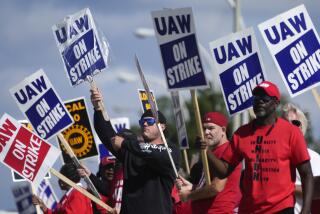Executives Get Greedy Despite Huge Paychecks
- Share via
Is the real problem with American business big money and small people?
Ross Johnson, the chief executive of RJR-Nabisco, has just lost his bid to become super-rich. If his management group’s leveraged buyout offer for RJR had beaten Kohlberg Kravis Roberts’ $25 billion, Johnson could have turned his $1.7-million annual compensation into $100 million in about six years.
Now KKR will find someone else to run the company, and Johnson will get his walking papers.
But not for trying to buy out the company he was appointed to lead--not for being greedy. Johnson was no greedier than other executives who have benefited from the LBO craze--notably Donald P. Kelly, the former chairman of Beatrice Foods who turned a KKR buyout into a fortune reported at $100 million.
So routine are LBOs that compensation specialists have a scale: A manager leading a buyout can make 10 to 17 times his salary.
In a leveraged buyout, investors buy a company’s shares with borrowed money and repay the loans from the firm’s cash flow--which is enhanced because interest payments cut taxes. The stock is then resold to the public at great profit for managers and investors.
Have they earned the bonanza by anything more than financial magic and a fast shuffle on the tax man? Not really.
Defenders of LBOs claim they increase efficiency--that pressure to meet debt payments and a shot at really big money, provide incentives for maximum performance.
But one has to wonder how much incentive U.S. executives need. Some 300 of them earned at least $1 million last year, and, according to the consulting firm Towers Perrin Forster & Crosby, they are already the world’s highest-paid managers.
Sometimes spectacularly so. Chairman John F. Welch of General Electric, thanks to exercise of stock options, makes more than 12 times the salary and bonus of Katsushige Mita, head of Japan’s comparably sized Hitachi, according to Fortune magazine--yet Hitachi may now lead GE in advanced electronics. Chrysler’s boss Lee A. Iacocca, at $17.5 million in salary and stock gains, makes 34 times the income of Tadashi Kume, the head of Honda--which soon may pass Chrysler in U.S. sales.
If salaries made companies competitive, U.S. business would lead the world. Sadly, it more often trails the field.
What’s gone wrong? Avarice has distorted the compensation system devised by Pierre Du Pont in 1904, when he turned the family chemical firm, E. I. Du Pont de Nemours, into a modern corporation. Du Pont introduced stock buying plans--stock options--to give non-family executives the “same personal and psychological involvement in the company as family members,” says a Du Pont history.
Later, Du Pont introduced stock options when he organized General Motors and installed the legendary Alfred P. Sloan Jr. as chairman.
Corrupted System
The system worked in those days. Du Pont was (and is) one of the world’s most inventive companies; under Sloan, GM made the best cars in the world. Managers and owners thought of building the business first and of finance and “shareholder value” second.
When Theodore Vail built American Telephone & Telegraph between 1907 and 1919, the stock didn’t go up. But the dividends were paid, and Vail’s main shareholder recognized that he was building value. That shareholder was J. P. Morgan, whose business acumen makes today’s Wall Streeters look like messenger boys.
Now Du Pont’s system has been corrupted, by company managers “looking to cover themselves against risk while maximizing their rewards,” says one banker. “They make things happen in finance, but not in new products and services--as Japanese companies do.”
Still, there is hope. The newest thinking on management compensation, says William White of Towers Perrin, is to devise a 20- to 30-year reward system for executives, based on what they do for market share, new products--the real business. “The idea is to create a cadre of managers who can become rich,” says White, “but only by succeeding long term.”
It’s a return to Pierre Du Pont, who saw managers as partners in the business--not as barracudas.
More to Read
Inside the business of entertainment
The Wide Shot brings you news, analysis and insights on everything from streaming wars to production — and what it all means for the future.
You may occasionally receive promotional content from the Los Angeles Times.










